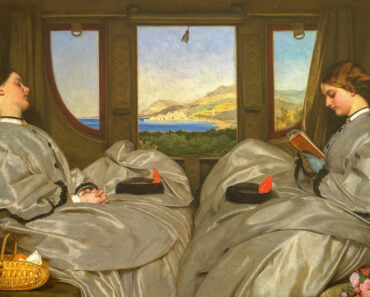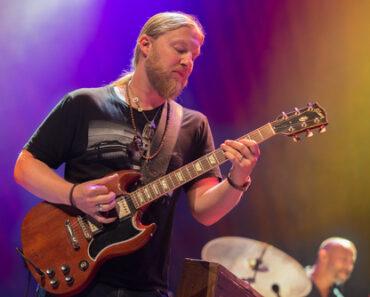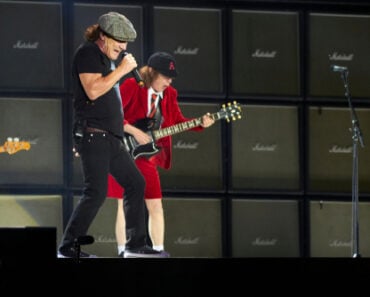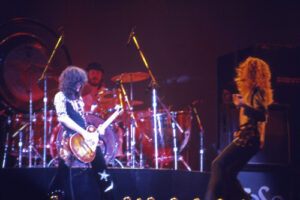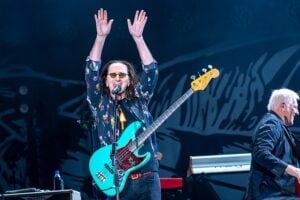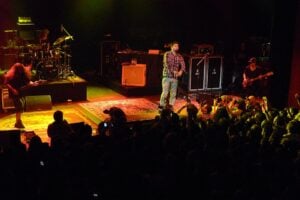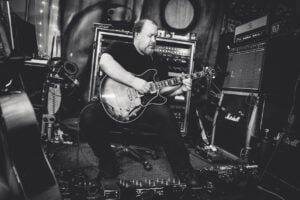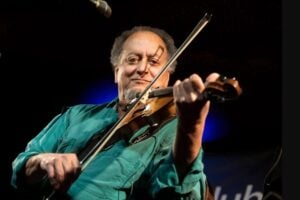
Feature Photo: Randy Miramontez / Shutterstock.com
Chicago’s story began in 1967 on the streets of Chicago, Illinois, when a group of ambitious musicians—originally calling themselves The Big Thing—set out to create a new sound that fused rock with a powerful brass section. The founding lineup included Walter Parazaider on woodwinds, Terry Kath on guitar and vocals, Danny Seraphine on drums, James Pankow on trombone, Lee Loughnane on trumpet, Robert Lamm on keyboards and vocals, and Peter Cetera on bass and vocals. Their collective ambition was to break new ground, not just as another rock band, but as something closer to a “rock and roll band with horns,” which would soon become their enduring trademark.
After relocating to Los Angeles in 1968 and signing with Columbia Records, the band changed its name to Chicago Transit Authority, then shortened it simply to Chicago after their debut album’s release in 1969. That double-LP, The Chicago Transit Authority, included tracks like “Does Anybody Really Know What Time It Is?” and “Beginnings,” both of which would later become hit singles. Their second album, Chicago (1970), also a double-LP, produced the enduring classic “25 or 6 to 4” and signaled the band’s arrival as one of the most original acts of the era.
Throughout the 1970s, Chicago’s output was prolific, with a string of albums—each numerically titled—that continually pushed their creative boundaries. Their third and fourth albums both cracked the top five on the Billboard 200, and by 1974, Chicago VII delivered yet another classic with “(I’ve Been) Searchin’ So Long.” The band’s ability to blend pop, jazz, and rock elements, coupled with sophisticated songwriting and arrangements, brought them a series of gold and platinum certifications. The tragic death of guitarist Terry Kath in 1978 deeply affected the group, but they pressed forward, recruiting Donnie Dacus and then Bill Champlin to help fill the void.
The 1980s marked a period of significant commercial resurgence for Chicago, thanks in large part to the songwriting and production partnership with David Foster. Albums such as Chicago 16 (1982) and Chicago 17 (1984) produced chart-topping hits like “Hard to Say I’m Sorry,” “Hard Habit to Break,” and “You’re the Inspiration.” Peter Cetera’s soaring vocals helped define the band’s sound during this period, and when he left to pursue a solo career in 1985, the band’s lineup continued to evolve with Jason Scheff stepping in on bass and vocals.
By the 1990s, Chicago had firmly established itself as one of the most successful American rock bands, with more than 120 million records sold worldwide. Their catalog had grown to include over two dozen studio albums, multiple live recordings, and a long string of hit singles. Chicago XXV: The Christmas Album (1998) demonstrated their versatility and ability to adapt to changing musical climates, and the band continued to tour relentlessly, bringing their signature sound to generations of fans.
Chicago’s awards and honors underscore their legacy. They have collected numerous gold and platinum albums, a Grammy Award for Best Pop Vocal Performance by a Duo, Group or Chorus (“If You Leave Me Now” in 1976), and a place in the Rock and Roll Hall of Fame (inducted in 2016). Their hits—“Saturday in the Park,” “Make Me Smile,” “Just You ’n’ Me,” “Colour My World,” and many more—are staples on classic rock and adult contemporary radio. Their innovative brass arrangements and skill at blending genres have been cited as influences by countless artists in pop, rock, and jazz.
Outside of music, Chicago’s members have participated in numerous philanthropic and educational activities, particularly in supporting music education and cancer research. Their charity work includes performances for benefit concerts, donations to schools, and collaborations with national organizations to promote the arts.
Over the decades, Chicago has experienced many lineup changes, with founding members Robert Lamm, Lee Loughnane, and James Pankow remaining at the core. The band’s longevity can be credited to its members’ ability to adapt, a deep commitment to musicianship, and the loyalty of a worldwide fan base. Their annual tours, often alongside other legendary acts, continue to attract enthusiastic crowds and introduce their music to new generations.
With over thirty-six albums, more than twenty Top 10 singles, and a career spanning over five decades, Chicago’s impact on American music remains profound. Their fusion of rock, pop, and jazz has stood the test of time, ensuring their place as one of the most enduring and innovative bands in history. They are loved not just for their extensive catalog of hits, but for their commitment to craft, their pioneering spirit, and the unmistakable sound that still fills stadiums and airwaves across the globe.
Top 20 Chicago Songs Of All Time
# 20 – Alive Again
“Alive Again” marked a turning point for Chicago as their first single after the departure of founding guitarist Terry Kath, and the first to feature Donnie Dacus on guitar. Written by James Pankow, the song was recorded in early 1978 at Criteria Studios in Miami, Florida, with Phil Ramone producing the Hot Streets album. The lineup for the recording included Peter Cetera on lead vocals and bass, Robert Lamm on keyboards, Donnie Dacus on guitar, Danny Seraphine on drums, with the brass section of Pankow, Lee Loughnane, and Walter Parazaider delivering a bright, revitalized horn arrangement.
Released in September 1978, “Alive Again” returned Chicago to the Top 20, peaking at number fourteen on the Billboard Hot 100. Notably, the track also features the Bee Gees on backing vocals, recorded while both groups were working in the same studio. Critics praised the single for its high energy and fresh sound, helping Hot Streets go platinum and ushering in a new era for the band following a period of profound transition.
# 19 – If You Leave Me Now
“If You Leave Me Now,” written and sung by bassist Peter Cetera, became Chicago’s signature ballad and one of the most commercially successful songs of their career. The track was recorded at Caribou Ranch in Nederland, Colorado, during the summer of 1976 for the album Chicago X, produced by James William Guercio. The band’s lineup featured Cetera on lead vocals and bass, Terry Kath on guitar, Robert Lamm on keyboards, Danny Seraphine on drums, Lee Loughnane on trumpet, James Pankow on trombone, and Walter Parazaider on woodwinds, with lush string arrangements by Jimmie Haskell adding a smooth orchestral touch. Released as a single in July 1976, “If You Leave Me Now” soared to number one on the Billboard Hot 100, becoming Chicago’s first chart-topping hit and earning the group two Grammy Awards: Best Pop Vocal Performance by a Duo, Group or Chorus and Best Arrangement Accompanying Vocalists.
# 18 – Lowdown
“Lowdown,” recorded in the summer of 1970 at Columbia Studios in New York City and released on Chicago III in January 1971, stands out as an early example of Peter Cetera stepping forward as a songwriter and lead vocalist. Produced by James William Guercio, the track features Peter Cetera on bass and vocals, Danny Seraphine on drums, Robert Lamm on keyboards, and the classic horn section of Lee Loughnane, James Pankow, and Walter Parazaider. But what truly sets this single apart—peaking at number 35 on the Billboard Hot 100—is Terry Kath’s jaw-dropping guitar solo, a performance widely cited as one of his most explosive and inventive on record. Kath’s fluid, raw playing not only defines the energy of the track but also cements “Lowdown” as a staple for guitar aficionados dissecting Chicago’s catalog.
# 17 – You’re The Inspiration
“You’re the Inspiration,” featured on Chicago’s 1984 album Chicago 17, is one of the band’s most enduring pop ballads and marked a high point of their 1980s resurgence. Written by Peter Cetera and David Foster, the track was recorded at the Record Plant in Los Angeles and produced by Foster, whose signature production style helped reshape Chicago’s sound during this period. The recording lineup included Cetera on lead vocals and bass, Bill Champlin on keyboards and backing vocals, Robert Lamm on additional keyboards, Lee Loughnane on trumpet, James Pankow on trombone, Walter Parazaider on saxophone, Chris Pinnick on guitar, and Danny Seraphine on drums, with Foster also contributing to the arrangement. Released as a single in October 1984, “You’re the Inspiration” reached number three on the Billboard Hot 100 and became a wedding and radio staple, thanks to Cetera’s expressive vocals, Champlin’s soaring harmonies, and a sophisticated, synth-driven arrangement.
# 16 – Hard To Say I’m Sorry
“Hard to Say I’m Sorry,” released as the lead single from Chicago 16 in May 1982, became a defining moment in the band’s transition into the polished pop-rock sound of the early 1980s. Written by Peter Cetera and producer David Foster, the song was recorded at the renowned Record Plant in Los Angeles with Foster at the production helm, reshaping the group’s sonic identity with lush synthesizers and a streamlined, radio-friendly arrangement. The session featured Peter Cetera on lead vocals and bass, Bill Champlin on keyboards and backing vocals, Robert Lamm on additional keyboards, Chris Pinnick on guitar, Danny Seraphine on drums, and Foster himself on keyboards, with the Chicago horn section making a brief but memorable late-song appearance. Released in the spring of 1982, “Hard to Say I’m Sorry” soared to number one on the Billboard Hot 100, earning the band a platinum single and a Grammy nomination for Best Pop Performance by a Duo or Group with Vocal.
# 15 – Call On Me
“Call On Me” was released as the lead single from Chicago’s Chicago VII album in June 1974, marking another successful entry in the band’s prolific 1970s period. Trumpeter Lee Loughnane wrote the song—his first major songwriting contribution to the band—and recorded at Caribou Ranch in Nederland, Colorado during the fall of 1973, with James William Guercio serving as producer. The lineup on this track features Peter Cetera on lead vocals and bass, Robert Lamm on keyboards, Terry Kath on guitar, Danny Seraphine on drums, and Chicago’s renowned horn section: Loughnane on trumpet, James Pankow on trombone, and Walter Parazaider on woodwinds. “Call On Me” is distinguished by its smooth, Latin-tinged groove and vibrant horn arrangements, which provided a bright, upbeat feel that resonated with radio listeners. Upon release, the single reached number six on the Billboard Hot 100 and climbed to number one on the Adult Contemporary chart.
# 14 – Old Days
“Old Days” was released as a single from Chicago’s 1975 album Chicago VIII, capturing the spirit of nostalgia through both its lyrics and energetic musical arrangement. Written by trombonist James Pankow, the song reflects on the memories of youth, referencing cultural touchstones like “baseball cards, comic books, and records” that defined growing up in America during the 1950s and 1960s. The track was recorded at Caribou Ranch in Nederland, Colorado, with longtime producer James William Guercio overseeing the sessions. Lead vocals were delivered by Peter Cetera. Released in April 1975, “Old Days” climbed to number five on the Billboard Hot 100
# 13 – Wishing You Were Here
“Wishing You Were Here” stands out as one of the most hauntingly beautiful tracks in Chicago’s catalog, originally released on the 1974 album Chicago VII. Written and sung by bassist Peter Cetera, the song was recorded at Caribou Ranch in Nederland, Colorado, under the guidance of producer James William Guercio. Its ethereal mood is heightened by layered harmonies from Beach Boys members Al Jardine, Carl Wilson, and Dennis Wilson, whose guest vocals blend seamlessly with Chicago’s own. The lineup on this track includes Cetera on lead vocals and bass, Terry Kath on acoustic guitar, Robert Lamm on Fender Rhodes electric piano, Danny Seraphine on drums, and the core horn section—James Pankow (trombone), Lee Loughnane (trumpet), and Walter Parazaider (woodwinds). Released as a single in September 1974, “Wishing You Were Here” climbed to number eleven on the Billboard Hot 100.
# 12 – (I’ve Been) Searchin’ So Long
“(I’ve Been) Searchin’ So Long” was released as the lead single from Chicago’s 1974 album Chicago VII and quickly became one of the group’s signature ballads. Written by James Pankow, the track was recorded at Caribou Ranch in Nederland, Colorado, with longtime producer James William Guercio at the helm. The recording features Peter Cetera on lead vocals and bass, Robert Lamm on Fender Rhodes electric piano, Terry Kath on guitar, Danny Seraphine on drums, and the signature Chicago horn section—Pankow (trombone), Lee Loughnane (trumpet), and Walter Parazaider (woodwinds)—who contribute both subtle background lines and dramatic crescendos.
The song is distinguished by its gentle opening, gradually building with orchestral arrangements and layered harmonies, culminating in a powerful and emotional climax. Released in February 1974, “(I’ve Been) Searchin’ So Long” peaked at number nine on the Billboard Hot 100, cementing its status as one of the era’s standout soft rock hits. Critics highlighted its seamless fusion of rock, jazz, and orchestral pop, and the song endures as a testament to Chicago’s versatility and skillful songwriting during their 1970s creative peak.
# 11 – Just You ‘n’ Me
“Just You ’n’ Me,” written by trombonist James Pankow, is a classic Chicago ballad featured on the band’s Chicago VI album, recorded in February 1973 at Caribou Ranch in Nederland, Colorado, and produced by James William Guercio. The song’s recording lineup included Peter Cetera on lead vocals and bass, Terry Kath on guitar, Robert Lamm on keyboards, Danny Seraphine on drums, with Pankow, Lee Loughnane, and Walter Parazaider providing the signature horn sound. Notable for its warm melody and soulful arrangement, “Just You ’n’ Me” features a memorable guitar solo by Kath and a striking soprano saxophone solo by Parazaider. Released as a single in September 1973, the track became one of Chicago’s biggest hits, peaking at number four on the Billboard Hot 100.
# 10 – Dialogue Part 1 and 2
“Dialogue (Part I & II)” stands as one of Chicago’s most ambitious and socially conscious recordings, written by keyboardist Robert Lamm for the 1972 album Chicago V. The song was recorded at Columbia Studios in New York City in September 1971, produced by James William Guercio. Built around a musical conversation between Terry Kath and Peter Cetera, the track features Kath’s impassioned “worried man” verses confronting Cetera’s “optimist,” creating a genuine back-and-forth both lyrically and vocally. Musically, the entire band is present: Kath on electric guitar, Cetera on bass, Lamm on piano and backing vocals, Danny Seraphine on drums, and the horn trio of James Pankow (trombone), Lee Loughnane (trumpet), and Walter Parazaider (woodwinds) providing dynamic accents and evolving arrangements as the song shifts from urgent dialogue to communal resolution.
The piece is split into two sections—Part I is the urgent exchange, while Part II blossoms into a hopeful chorus: “We can make it better.” Released as a single, “Dialogue (Part I & II)” reached number twenty-four on the Billboard Hot 100, and remains a prime example of Chicago’s ability to blend pop hooks, jazz-inflected rock, and pointed commentary on the issues of its time.
# 9 – Feelin’ Stronger Every Day
“Feelin’ Stronger Every Day,” co-written by Peter Cetera and James Pankow, marked a pivotal point for Chicago, blending personal lyricism with the band’s signature horn-driven rock sound. The track was recorded in the fall of 1972 at Caribou Ranch in Nederland, Colorado, and produced by James William Guercio for the album Chicago VI, released in June 1973. The lineup features Peter Cetera on lead vocals and bass, Terry Kath on guitar, Robert Lamm on keyboards, Danny Seraphine on drums, with Lee Loughnane, James Pankow, and Walter Parazaider forming the powerhouse brass section. Released as a single in May 1973, “Feelin’ Stronger Every Day” climbed to number ten on the Billboard Hot 100, bolstered by its dynamic structure and uplifting theme reflecting Cetera’s recovery from a difficult breakup.
# 8 – Colour My World
“Colour My World,” written by James Pankow, is one of Chicago’s most enduring ballads, originally appearing as part of the “Ballet for a Girl in Buchannon” suite on the band’s 1970 double album Chicago (also known as Chicago II). Recorded in August 1969 at Columbia Studios in New York City and produced by James William Guercio, the song features Terry Kath’s tender lead vocal and a signature piano accompaniment by Robert Lamm, with Peter Cetera on bass, Danny Seraphine on drums, and a memorable flute solo by Walter Parazaider. Distinguished by its understated arrangement and romantic lyricism, “Colour My World” became a staple at proms and weddings throughout the 1970s. Although not originally released as an A-side single, it reached a wide audience as the B-side of both “Make Me Smile” and “Beginnings,” contributing to the band’s growing popularity and showcasing a softer, more intimate side of Chicago’s sound.
# 7 – Make Me Smile
“Make Me Smile” stands as a defining single from Chicago’s 1970 album Chicago (also known as Chicago II), written by James Pankow and recorded in August 1969 at Columbia Studios in New York City. Produced by James William Guercio, the track features Terry Kath’s distinctive lead vocals and searing guitar, with Robert Lamm on keyboards, Peter Cetera on bass and harmony vocals, Danny Seraphine on drums, and the powerhouse horn section of Lee Loughnane (trumpet), Pankow (trombone), and Walter Parazaider (saxophone). Originally conceived as the opening movement of the multipart “Ballet for a Girl in Buchannon” suite, “Make Me Smile” was edited into a standalone single that became Chicago’s first Top Ten hit, peaking at number nine on the Billboard Hot 100.
# 6 – Beginnings
“Beginnings,” written by Robert Lamm, was recorded by Chicago in January 1969 at CBS Studios in Los Angeles for their debut album Chicago Transit Authority. Produced by James William Guercio, the track features Lamm on lead vocals and keyboards, Terry Kath on guitar, Peter Cetera on bass and harmony vocals, Danny Seraphine on drums, with the band’s signature horn section—Lee Loughnane (trumpet), James Pankow (trombone), and Walter Parazaider (tenor saxophone)—playing a central role in the arrangement. Known for its bright acoustic guitar, intricate horn charts, and the extended percussive coda, “Beginnings” captures Chicago’s early fusion of rock and jazz elements. Initially released as a single in 1969 and reissued in 1971, it reached number seven on the Billboard Hot 100.
# 5 – Questions 67 and 68
“Questions 67 and 68” was written by Robert Lamm and recorded by Chicago in January 1969 at CBS Studios in Los Angeles, with James William Guercio producing for the debut double album Chicago Transit Authority. Released as the band’s very first single in July 1969 and reissued in 1971, it ultimately reached number twenty-four on the Billboard Hot 100. The lyrics reflect Lamm’s introspection about a past relationship, and the number in the title refers to the years 1967 and 1968, when the romance took place. The track is an early showcase of Chicago’s energetic fusion of rock and brass, setting the tone for the band’s innovative approach on their debut.
# 4 – Does Anybody Really Know What Time It Is?
“Does Anybody Really Know What Time It Is?” was written by Robert Lamm and recorded by Chicago in January 1969 at CBS Studios, Los Angeles, with production handled by James William Guercio for the band’s debut double album, Chicago Transit Authority. The recording features Robert Lamm on lead vocals and keyboards, Terry Kath on guitar, Peter Cetera on bass and backing vocals, Danny Seraphine on drums, Lee Loughnane on trumpet, James Pankow on trombone, and Walter Parazaider on tenor saxophone. Notable for its jazz-influenced piano intro and prominent brass section, the song blends pop and jazz-rock elements, with the group’s tight musicianship evident throughout. Released as a single in late 1970, it peaked at number seven on the Billboard Hot 100 and became one of Chicago’s signature tracks, marking an early highlight in the band’s recording career.
# 3 – 25 or 6 to 4
“25 or 6 to 4” was recorded in January 1969 at CBS Studios in Los Angeles, produced by James William Guercio for the Chicago II album. Written by Robert Lamm, the track features Peter Cetera on lead vocals and bass, Terry Kath delivering a searing, multi-section guitar solo, Danny Seraphine on drums, Robert Lamm on keyboards, Lee Loughnane on trumpet, James Pankow on trombone, and Walter Parazaider on woodwinds. The song is structured around a driving minor-key riff and a distinctive brass arrangement, with Kath’s guitar solo widely recognized as a technical highlight in the band’s discography. Released as a single, “25 or 6 to 4” reached number four on the Billboard Hot 100 in 1970, and remains one of the most performed and recognizable songs in Chicago’s catalog.
# 2 -Liberation
“Liberation,” the ambitious closing track on Chicago Transit Authority—recorded at CBS Studios in Los Angeles during January and February 1969 and produced by James William Guercio—showcases Terry Kath at his creative zenith with a solo that stretches over fifteen minutes and remains arguably the most electrifying guitar performance of his recording career.
The band’s original lineup—Terry Kath (guitar, lead vocals), Robert Lamm (keyboards, vocals), Peter Cetera (bass, vocals), Danny Seraphine (drums), Lee Loughnane (trumpet), James Pankow (trombone), and Walter Parazaider (woodwinds)—delivers an instrumental tour de force, but it’s Kath’s extended, improvised solo that commands attention: wild, expressive, and technically daring, it drew widespread admiration from both critics and musicians, including a well-known nod from Jimi Hendrix. Though never released as a single, “Liberation” quickly became a signature piece for the band’s live shows, further cementing Kath’s legacy as a guitarist’s guitarist and establishing the group’s experimental edge from the very start of their recording career.
# 1 – Saturday In The Park
Released in 1972 as part of Chicago’s landmark album Chicago V, “Saturday in the Park” stands as one of the band’s most iconic tracks, written and sung by keyboardist Robert Lamm. The song was recorded in September 1971 at the fabled 52nd Street Studios in New York City, with James William Guercio at the production helm, shaping its now-classic sound. The lineup featured Robert Lamm (lead vocals, piano), Peter Cetera (bass, backing vocals), Terry Kath (guitar, backing vocals), Danny Seraphine (drums), Lee Loughnane (trumpet), James Pankow (trombone), and Walter Parazaider (woodwinds), each contributing to the distinctive brass-driven arrangement.
Inspired by Lamm’s experience in Central Park on a festive Fourth of July, the song’s upbeat, piano-driven melody and vivid lyrics captured a sense of urban optimism and community, resonating with listeners and critics alike. “Saturday in the Park” became Chicago’s highest-charting single at the time, peaking at number three on the Billboard Hot 100, and has since been widely recognized for its enduring appeal and its bright, quintessential early-70s sound that helped define the band’s career.
Check out similar articles on ClassicRockHistory.com Just click on any of the links below……
An Interview With Chris Pinnick, Formerly Of Chicago
Why Jimi Hendrix Called Chicago’s Terry Kath The Best Guitarist In The Universe
Complete List Of Chicago Band Members
Tony Obrohta of Chicago: 10 Albums That Changed My Life
A Revisit Of Terry Kath’s Killer Guitar Solo On Chicago’s “Liberation”
Complete List Of Chicago Albums And Songs
Top 10 Chicago Songs of the 1970’s
Read More: Artists’ Interviews Directory At ClassicRockHistory.com
Read More: Classic Rock Bands List And Directory




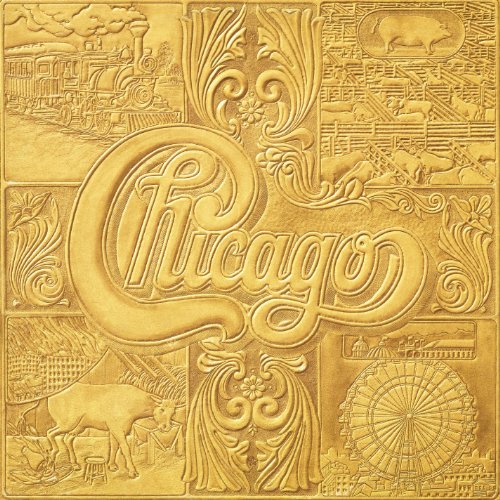



![Chicago Transit Authority (Remastered) [CD]](http://m.media-amazon.com/images/I/51Dfwa9tWjL._SL500_.jpg)


